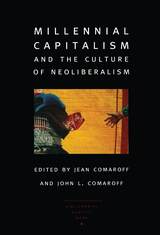3 books by Weller, Robert P.

Confucianism and Ecology
The Interrelation of Heaven, Earth, and Humans
Mary Evelyn Tucker
Harvard University Press, 1998
Confucianism demonstrates a remarkable wealth of resources for rethinking human-earth relations. This second volume in the series on religions of the world and the environment includes sixteen essays that address the ecological crisis and the question of Confucianism from three perspectives: the historical describes this East Asian tradition's views of nature, social ethics, and cosmology, which may shed light on contemporary problems; a dialogical approach links Confucianism to other philosophic and religious traditions; an examination of engaged Confucianism looks at its involvement in concrete ecological issues.
[more]

Millennial Capitalism and the Culture of Neoliberalism
Jean Comaroff and John L. Comaroff, eds.
Duke University Press, 2001
The essays in Millennial Capitalism and the Culture of Neoliberalism pose a series of related questions: How are we to understand capitalism at the millennium? Is it a singular or polythetic creature? What are we to make of the culture of neoliberalism that appears to accompany it, taking on simultaneously local and translocal forms? To what extent does it make sense to describe the present juncture in world history as an “age of revolution,” one not unlike 1789–1848 in its transformative potential?
In exploring the material and cultural dimensions of the Age of Millennial Capitalism, the contributors interrogate the so-called crisis of the nation-state, how the triumph of the free market obscures rising tides of violence and cultures of exclusion, and the growth of new forms of identity politics. The collection also investigates the tendency of neoliberal capitalism to produce a world of increasing differences in wealth, environmental catastrophes, heightened flows of people and value across space and time, moral panics and social impossibilities, bitter generational antagonisms and gender conflicts, invisible class distinction, and “pariah” forms of economic activity. In the process, the volume opens up an empirically grounded, conceptual discussion about the world-at-large at a particularly momentous historical time—when the social sciences and humanities are in danger of ceding intellectual initiative to the masters of the market and the media.
In addition to its crossdisciplinary essays, Millennial Capitalism and the Culture of Neoliberalism—originally the third installment of the journal Public Culture’s “Millennial Quartet”—features several photographic essays. The book will interest anthropologists, political geographers, economists, sociologists, and political theorists.
In exploring the material and cultural dimensions of the Age of Millennial Capitalism, the contributors interrogate the so-called crisis of the nation-state, how the triumph of the free market obscures rising tides of violence and cultures of exclusion, and the growth of new forms of identity politics. The collection also investigates the tendency of neoliberal capitalism to produce a world of increasing differences in wealth, environmental catastrophes, heightened flows of people and value across space and time, moral panics and social impossibilities, bitter generational antagonisms and gender conflicts, invisible class distinction, and “pariah” forms of economic activity. In the process, the volume opens up an empirically grounded, conceptual discussion about the world-at-large at a particularly momentous historical time—when the social sciences and humanities are in danger of ceding intellectual initiative to the masters of the market and the media.
In addition to its crossdisciplinary essays, Millennial Capitalism and the Culture of Neoliberalism—originally the third installment of the journal Public Culture’s “Millennial Quartet”—features several photographic essays. The book will interest anthropologists, political geographers, economists, sociologists, and political theorists.
Contributors. Scott Bradwell, Jean Comaroff, John L. Comaroff, Fernando Coronil, Peter Geschiere, David Harvey, Luiz Paulo Lima, Caitrin Lynch, Rosalind C. Morris, David G. Nicholls, Francis Nyamnjoh, Elizabeth A. Povinelli, Paul Ryer, Allan Sekula, Irene Stengs, Michael Storper, Seamus Walsh, Robert P. Weller, Hylton White, Melissa W. Wright, Jeffrey A. Zimmerman
[more]

Power and Protest in the Countryside
Studies of Rural Unrest in Asia, Europe, and Latin America
Robert P. Weller and Scott Guggenheim
Duke University Press, 1993
“Constitutes an important and timely addition to the literature on peasant rebellion; wisely, the editors have been eclectic in drawing from some of the leading historians, anthropologists, political scientists, and sociologists active in the field an analysis of the forms that rural violence has taken through the past three centuries.”—Pacific Affairs
[more]
READERS
Browse our collection.
PUBLISHERS
See BiblioVault's publisher services.
STUDENT SERVICES
Files for college accessibility offices.
UChicago Accessibility Resources
home | accessibility | search | about | contact us
BiblioVault ® 2001 - 2024
The University of Chicago Press









